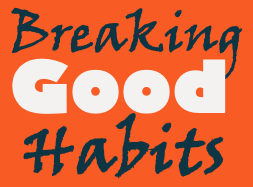We spend a lot of time and energy trying to break bad habits. Bad habits can make us unproductive, unhappy, they can even cause us ruin.
But what if we have to break GOOD habits to succeed?
Sounds paradoxical, right? Well, that’s because it is.
As leaders leading organizations and initiatives every day, we must learn and grow great habits to get things done. A few examples: decisiveness, bias for action, a process focus, the ability to communicate, even our reliance on our deep business knowledge.
But things are different when we’re leading change. Change efforts involve something that everyday leadership doesn’t engage with so much—our people, the folks who will carry the change on their backs, but only if they decide to do it.
So our great habits can work against us when leading change. We have to learn new habits to lead change (and keep the old ones, too, for everyday leadership). These new habits often require us to do things that are counter to our everyday. Examples:
- We’re in the habit of solving problems with decisiveness, but when we’re leading change, we have to first listen and bring our people in. It needs to be “their idea” (sincerely) if they’re ever going to carry it for us. We can’t go deciding the change and handing it down to our people.
- We also have a habit of communicating using the written and spoken word in our everyday leadership, but during change communications is 90% action, only 10% words.
- Our bias for action—a great attribute every day—overlooks the need to gain alignment before acting on a change.
Change is a paradox, it turns out. We must face this paradox if we ever want to lead it.
Here’s to breaking GOOD habits!

